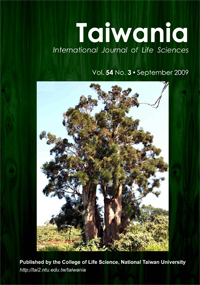Research Paper
Contrasting Effects of Aqueous Tissue Extracts from an Invasive Plant, Bidens pilosa L. var. radiata, on the Performance of Its Sympatric Plant Species
Hsiao-Mei Hsu, Wen-Yuan Kao
Published on: September 2009
Page: 255 - 260
DOI: 10.6165/tai.2009.54(3).255
Abstract
Bidens pilosa L. var. radiata Sch. Bip., a common weed in lowland Taiwan, is listed as one of the twenty most noxious invasive plants in Taiwan. In this study, we examined the effect of aqueous extracts of leaves, stems and roots of the invasive plant on germination and growth of seedlings (estimated by measuring the elongation of hypocotyls and radicals) of the same species and two other sympatric species, B. bipinnata and Ageraturem conyzoides. The objective of this study was to understand whether the aqueous tissue extracts affected the performance of the target species and whether these effects varied among tissue types and among target species. We found that the germination percentage of seeds of B. bipinnata was significantly reduced by root and leaf extracts, that of B. pilosa var. radiata was also significantly reduced by the application of root extract, while that of A. conyzoides was not affected by any of the three tissue extracts. The application of stem and leaf extracts inhibited the elongation of radicals of B. pilosa var. radiata, consequently, the growth of seedlings of this species was decreased in these two treatments. Though the elongation of hypocotyls was stimulated by leaf extract, the overall growth of seedlings of B. bipinnata was not affected by any tissue extract. In contrast, all three extracts stimulated the elongation of hypocotyls and radicals of A. conyzoides, consequently, the overall growth of seedlings of this plant was promoted by all three extracts. These results revealed that aqueous extracts from tissue of B. pilosa var. radiata had differential effect on the emergence and seedling growth of the three target species. The inhibition effect of its root and leaf extracts on the germination of B. bipinnata may partially explain the overwhelming dominance of B. pilosa var. radiata over B. bipinnata when they are sympatric.
中文摘要
大花咸豐草 (Bidens pilosa L. var. radiate) 是臺灣平地常見雜草,目前被列為臺灣二十種入侵性嚴重的植物之一。本文研究大花咸豐草根、莖、葉水溶液萃取液對同種,以及共域的鬼針草和白花霍香薊 (Ageraturem conyzoides) 種子發芽及幼苗生長(以胚根和胚莖的總長度計算) 的影響;目的在瞭解大花咸豐草組織萃取液是否會抑制其共域植物的表現,以及其影響的程度是否有所不同。結果發現:根和葉水溶液萃取液顯著降低鬼針草的種子發芽率,大花咸豐草的種子發芽率也明顯受根水溶液萃取液抑制;然而白花霍香薊的種子發芽率卻完全未受這三種組織水溶液萃取液的影響。莖、葉水溶液萃取液顯著抑制大花咸豐草胚根的長度,導致大花咸豐草在這兩種處理下,其幼苗的生長顯著降低;雖然葉水溶液萃取液促進鬼針草胚莖長度,但幼苗整體的生長並沒明顯受三種組織水溶液萃取液的影響;三種組織水溶液萃取液均顯著促進白花霍香薊的胚根和胚莖的長度,因此三種組織水溶液萃取液顯著增加白花霍香薊幼苗生長。這些結果顯示,大花咸豐草水溶液萃取液對其共域植物的確有不同程度影響;又當大花咸豐草和鬼針共域時,鬼針族群數量減少,可能和其種子發芽率受到大花咸豐草抑制有關。
Keyword: Ageraturem conyzoides, aqueous tissue extracts, Bidens pilosa L. var. radiata Sch. Bip., B. bipinnata, invasive plants. 白花霍香薊、組織水溶液萃取液、大花咸豐草、鬼針草、入侵植物。


